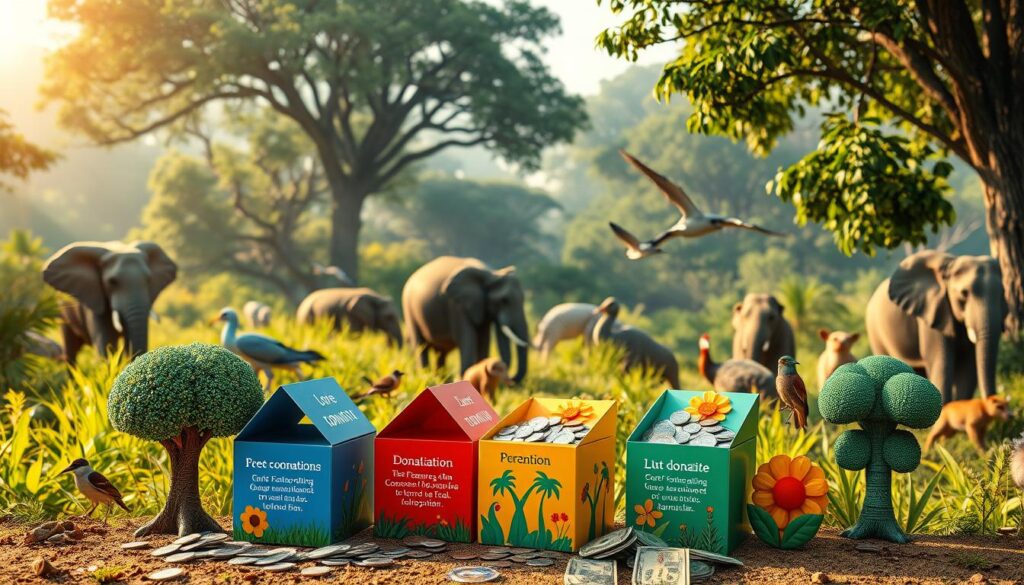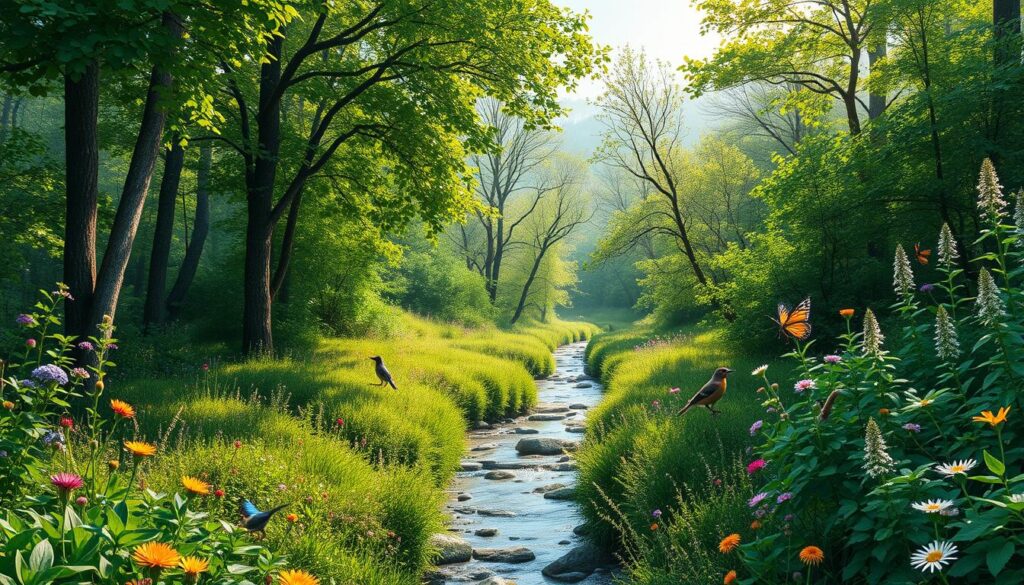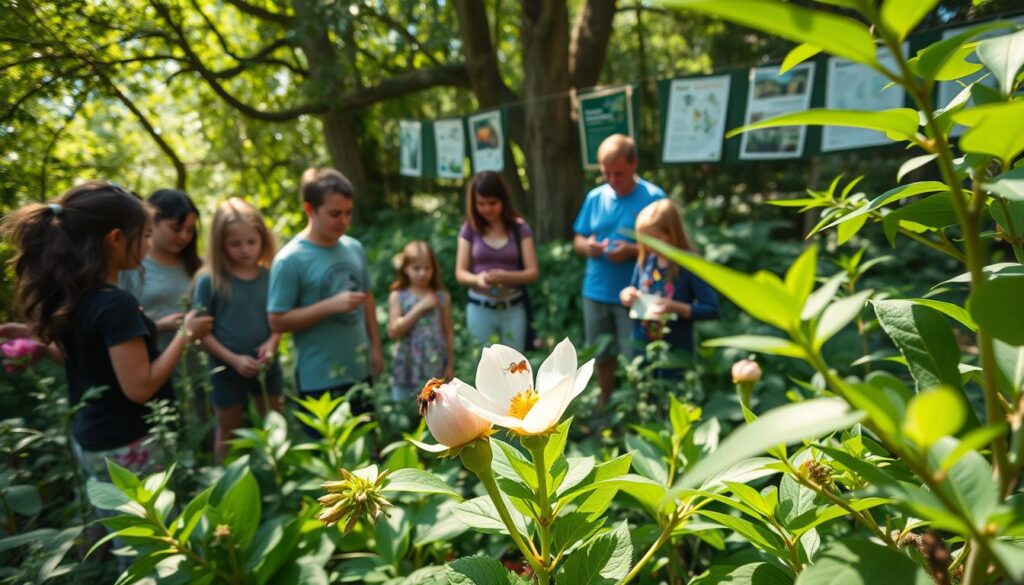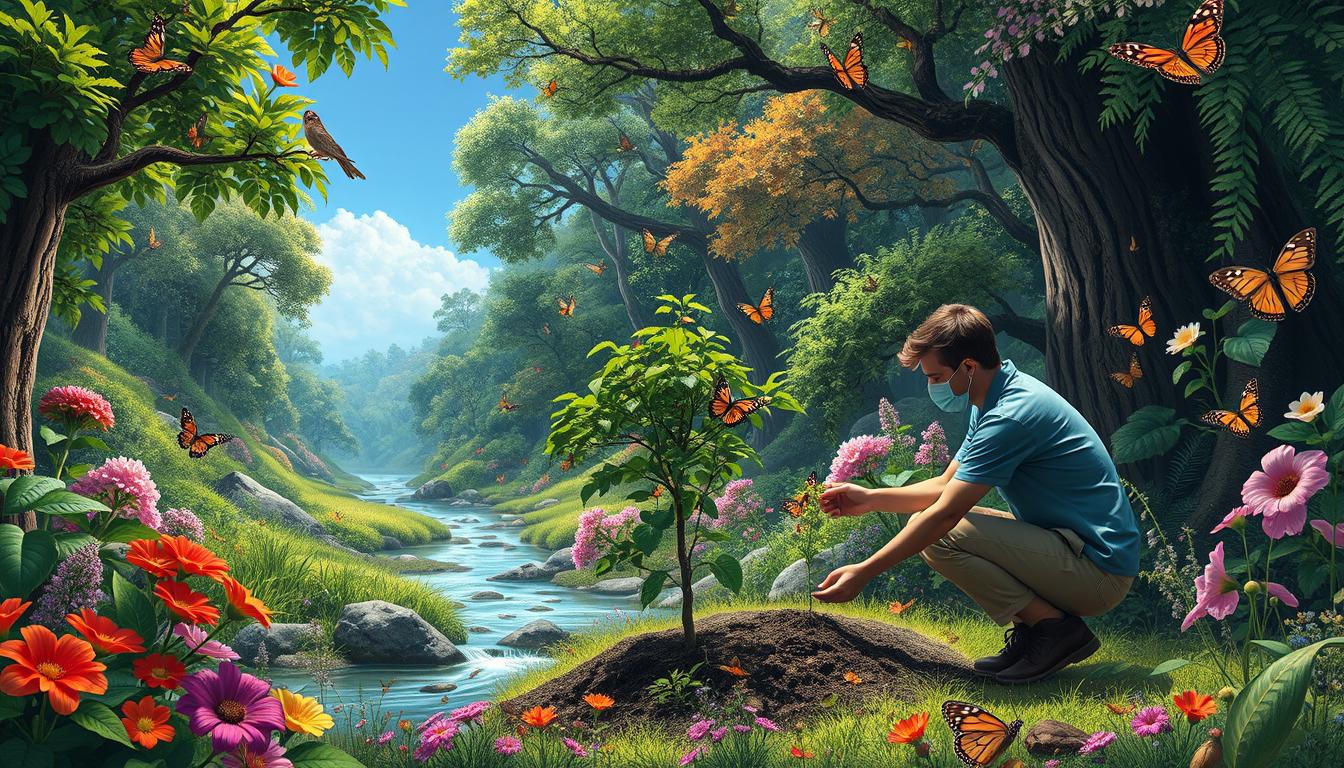Humans live with over 8 million other species. We must protect the environment for future generations and all living things. This means keeping ecosystems and nature safe for countless species.
There are many ways for individuals to help nature conservation. We can start with small actions, join our communities, or support conservation groups. By doing so, we can help keep life on Earth balanced.
Key Takeaways
- Individuals can reduce their ecological footprint through recycling, conserving resources, and making sustainable consumption choices.
- At the community level, planting native species, creating wildlife habitats, and protecting local wildlife are impactful ways to conserve nature.
- Participating in conservation initiatives, adopting animals, and donating to trusted environmental groups are effective ways to support nature conservation efforts.
- Connecting with nature through outdoor activities and citizen science projects can inspire and empower individuals to become active stewards of the environment.
- Understanding the importance of biodiversity and our human impact on ecosystems is crucial to protecting the natural world for future generations.
Simple Actions to Reduce Your Ecological Footprint
It’s important to reduce our ecological footprint to save nature and fight climate change. By choosing sustainable options every day, we can lessen our harm to the environment. Here are some easy steps to help you reduce your ecological footprint:
Recycle and Reduce Waste
- Join recycling efforts and don’t litter to cut down on waste.
- Use reusable water bottles, shopping bags, and skip disposable items like straws and cutlery to lessen plastic waste.
- Choose to swap, donate, or fix items instead of buying new ones to save resources.
Conserve Water and Energy
- Turn off lights and gadgets when you’re not using them to save energy.
- Use energy-saving appliances and use less water during activities like showering and washing dishes.
- Support renewable energy to fight climate change and improve air quality.
Sustainable Consumption Choices
Make smart choices when you shop by picking locally-sourced, organic, and eco-friendly products. This can greatly reduce your ecological impact and support a circular economy.
By following these simple steps, you can lessen your ecological footprint and help protect our natural resources. Remember, every small action you take can help make a big difference in creating a greener future.
Conserve nature in Your Local Community
You don’t need to save the world alone. You can help by doing small things in your community. Support wildlife habitats, native plants, and urban biodiversity in your own way.
Plant Native Species and Create Wildlife Habitats
Begin by planting native plants in your garden or yard. They offer food and shelter for local wildlife. Stay away from invasive species that harm the ecosystem.
You can also build bat houses, bird houses, and “bee hotels”. These give pollinators and other animals a safe place to live.
| Native Plant Examples | Wildlife Supported |
|---|---|
| Purple Coneflower | Bees, Butterflies, Birds |
| Serviceberry | Birds, Small Mammals |
| Blazing Star | Bees, Butterflies, Moths |
Protect Local Wildlife
Slow down when driving to avoid hitting wildlife crossing roads. Don’t feed wild animals as it messes with their natural ways. Also, keep pets inside to protect local wildlife.
These small actions can greatly help local conservation and urban greening. They make your backyard habitat healthy for future generations.
Get Involved in Conservation Initiatives
People can really help nature by joining in on various projects. You can volunteer with groups focused on conservation or take part in citizen science. These activities let you get your hands dirty and help protect our planet.
Conservation volunteering is a great way to get involved. Many places offer volunteer jobs, like helping with maintenance or leading tours. Some even provide housing for volunteers. It’s a chance to learn about conservation and help out.
- Volunteer at local nature reserves or national parks
- Assist with habitat restoration and wildlife monitoring
- Participate in beach cleanups and trail maintenance
Citizen science projects are also a great way to help. You can help track wildlife, study migration patterns, or map invasive plants. Your work helps conservationists make better plans.
| Conservation Initiative | Description | Impact |
|---|---|---|
| Ash Meadows National Wildlife Refuge | A refuge recognized for the conservation of endemic plant and animal species | Protects rare and endangered species, such as the Devils Hole pupfish |
| Walk for the Wild | A conservation event that emphasizes human connections with nature and ecosystem protection | Raises awareness and funds for wildlife conservation efforts |
| Fairfax County Chesapeake Bay Watershed Cleanup | An annual event where volunteers remove trash from local watersheds | In 2023, 417 volunteers dedicated 936 hours to remove 1.8 tons of trash |
Doing nature-based activities like outdoor recreation and environmental education can also help. They help us appreciate nature more and encourage us to protect it.
“Every individual has the power to make a meaningful difference in conservation. Whether through volunteering, citizen science, or simply spending more time in nature, we can all contribute to protecting our planet’s precious ecosystems.”
Support Conservation Organizations

Helping nature by supporting conservation groups is a great way to make a difference. These non-profits work hard to protect ecosystems, restore habitats, and save endangered species worldwide.
Adopt an Animal
Symbolically adopting an animal is a special way to help. Organizations like Defenders of Wildlife and World Wildlife Fund offer this. Your donation supports important work like habitat improvement and species research.
Donate to Trusted Environmental Groups
Donating to well-known environmental charities is also very effective. Groups like the Humane Society, National Wildlife Federation, and local wildlife shelters use your money to protect nature. They work to save biodiversity and restore habitats.
You can also help by signing petitions, writing to your representatives, and joining in advocacy efforts. These actions support the work of conservation groups.
| Conservation Organization | Focus Area | Noteworthy Facts |
|---|---|---|
| Defenders of Wildlife | Endangered species protection, habitat restoration | Offers animal adoption programs to support conservation |
| World Wildlife Fund (WWF) | Biodiversity conservation, climate action | One of the largest environmental organizations globally |
| The Humane Society | Animal welfare, wildlife protection | Works to safeguard animals and their habitats |
| National Wildlife Federation | Environmental education, conservation advocacy | Largest private, non-profit conservation group in the US |
By supporting these organizations, you can help protect our planet and its biodiversity. It’s a vital role for individuals to play.
Connect with nature

Connecting with nature is a powerful way to help conservation and appreciate the environment. Spending time outside, joining citizen science projects, and doing nature-based activities can strengthen our nature connection. This connection inspires us to protect our planet.
Spend Time Outdoors
Visiting national parks, nature reserves, and local green spaces is beneficial. Outdoor recreation boosts mental and physical health. It also helps us understand and value nature.
Whether hiking, camping, or just walking, nature time is key. It builds a sense of environmental awareness and a wish to save our ecosystems.
Participate in Citizen Science Projects
Citizen science projects let people help with wildlife monitoring and species identification. Using apps or joining data collection activities, we can help with environmental education. This work is crucial for conservation.
Doing eco-tourism, nature-based therapy, and biophilic activities also helps. They improve mindfulness and reduce eco-anxiety. They also support climate change education and conservation games. A strong nature connection empowers us to protect nature.
“The more clearly we can focus our attention on the wonders and realities of the universe about us, the less taste we shall have for destruction.”
– Rachel Carson, Silent Spring
Educate Yourself on nature conservation

Learning about nature conservation is key to protecting our planet. It helps us understand how ecosystems work together and the importance of biodiversity. We also learn about dangers like climate change and habitat loss.
Knowing about conservation biology and evidence-based conservation lets us help. We can support efforts to save our environment. Keeping up with news, research, and conservation movements motivates us to act.
To learn more about nature conservation, check out these resources:
- Online courses and webinars on ecosystem services, endangered species, and sustainable development
- Educational materials from trusted conservation organizations and environmental advocacy groups
- Podcasts and documentaries on environmental issues and conservation efforts
- Local community events or nature workshops to learn about conservation initiatives near you
By always learning more about nature conservation, you can become a strong advocate. You’ll help protect our planet’s natural resources and biodiversity.
“Environmental illiteracy is identified as a major impediment to protecting ecosystems.”
Also Read : Best Wildlife Photography Courses for Panda and Animal Lovers
Conclusion
Individuals can greatly help in nature conservation efforts. We can start with simple actions like reducing our waste and supporting local conservation groups. By doing so, we help protect the biodiversity and ecosystem services that are crucial for life on Earth.
We must act as environmental stewards for the future. Our actions today will shape the world for tomorrow. By working together, we can fight climate change, restore habitats, and save endangered species. This way, we ensure a sustainable future for all.
Embracing environmental education and sustainable living is key. It inspires others to join us in protecting the planet. Together, we can build a greener future, preserving the natural resources for future generations.
FAQs
Q: How can I stay updated with the latest conservation news?
A: You can follow various environmental organizations, subscribe to newsletters, and join conservation-focused social media groups to stay informed about the latest conservation news.
Q: Why is nature conservation important for life on earth?
A: Nature conservation is important for life on earth because it maintains biodiversity, ensures the sustainability of ecosystems, and protects the resources that all living beings depend on.
Q: What are some ways to keep nature healthy in my community?
A: You can keep nature healthy by participating in local conservation projects, reducing waste, planting trees, and advocating for the protection of protected areas in your community.
Q: How does conservation work impact the conservation of natural resources?
A: Conservation work impacts the conservation of natural resources by promoting sustainable practices, protecting habitats, and ensuring that resources are used responsibly to prevent extinction and degradation.
Q: How did Theodore Roosevelt contribute to nature conservation?
A: Theodore Roosevelt was a key figure in nature conservation in the United States, establishing national parks and protected areas, and promoting a conservation ethic that emphasized the responsible use of natural resources.
Q: What is the difference between conservation and preservation?
A: Conservation seeks to manage and use natural resources sustainably, while preservation aims to protect nature from human use altogether, focusing on maintaining natural areas in their untouched state.
Q: What role do freshwater ecosystems play in conservation efforts?
A: Freshwater ecosystems are crucial for biodiversity and provide essential services, such as clean water and habitat for various species, making their conservation vital for overall ecological health.
Q: How can individuals approach conservation in their daily lives?
A: Individuals can approach conservation by reducing their carbon footprint, minimizing waste, supporting local conservation initiatives, and educating others about the importance of nature protection and biological conservation.
Q: What is evidence-based conservation and why is it important?
A: Evidence-based conservation is the application of evidence in conservation efforts to ensure that strategies are effective and based on scientific data, which is crucial for successful conservation outcomes.
Q: How can I get involved in conservation near my area?
A: You can get involved in conservation near your area by volunteering with local organizations, participating in clean-up events, and attending workshops or seminars focused on conservation initiatives.
Source Links
- https://kids.frontiersin.org/articles/10.3389/frym.2019.00084
- https://createthegood.aarp.org/volunteer-ideas/protect-wildlife.html
- https://news.climate.columbia.edu/2018/12/27/35-ways-reduce-carbon-footprint/
- https://wwf.panda.org/act/live_green
- https://news.stanford.edu/stories/2024/01/eight-simple-meaningful-eco-friendly-actions-can-incorporate-life

